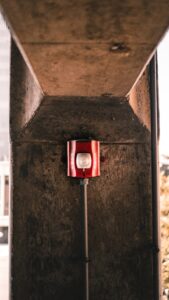
Houston commercial fire alarm systems are subject to many different codes and regulations. Whether installing fire safety systems for a new construction project or upgrading systems in existing buildings, it’s essential to understand applicable codes. Working with a fire alarm expert can help ensure your systems meet building and local fire codes. However, there are a few common things to understand about fire alarms in businesses.
Meeting Code Requirements for Houston Commercial Fire Alarm Systems
Practically every commercial building needs fire alarm systems. These alarms help inform occupants of a fire so they can evacuate for life safety. Because they are so necessary for safety, there are many codes that apply to commercial fire alarms to make sure they work properly during an emergency. The easiest way to meet code requirements for your fire alarms is to work with a fire system expert. Local fire alarm specialists know the rules set down by your local authority having jurisdiction. However, there are a few general pieces of information that can be helpful as you consider different fire system options.
Initiation Options for Houston Commercial Fire Alarm Systems
Initiation devices are an important part of Houston commercial fire alarm systems. These devices are what detect the fire and sound the alarm. Initiation devices must be reliable and sensitive enough for early detection of a fire, but not so sensitive that you frequently experience false alarms.
Most buildings use both smoke detectors and heat detectors to trigger alarms. Heat detectors are helpful for active fires where flames increase the temperature inside the building, while smoke detectors can help activate alarms for fires in the beginning stages or for fires that are still smoldering. Also, in most cases you will need manual pull stations. This allows someone in your building to sound the alarm if they detect a fire before smoke or heat detectors can. As you look at fire alarm options for your business, think about the types of initiation devices that work best for your application.
Alarm Sound Levels
Another important thing to consider is the sound level for your fire alarms. Codes typically require horn/strobe devices. These alarms use a horn-like noise and a strobing light to alert people of an emergency. Alarms must be loud to get people’s attention. In most cases, they must be at least 15 decibels above the average ambient level of noise. For example, in most offices the ambient sound level is around 50 decibels, so fire alarms must be at least 65 decibels. However, ADA codes for fire alarm systems have a maximum allowable level of 110 decibels. Our team can help you determine the right sound level for your alarm.
Optional Fire Alarm Enhancements
In addition, there are many additional features you can add to your fire alarm systems. For instance, many companies today integrate fire alarms with Houston business security systems. This can allow your facility to utilize mass notification systems in the event of a fire or to monitor both systems at one time.
Another common addition for Houston commercial fire alarm systems is to use voice systems in addition to horns and strobes. These systems inform occupants to evacuate, helping cut down on confusion during a fire.
Fire Alarms and Houston Business Security Systems from Securecomm Technologies
When you need Houston commercial security systems and fire alarms, choose our experts at Securecomm Technologies. We offer comprehensive services for system design, installation, maintenance, and monitoring tailored to your needs. Our security and life safety solutions are designed to suit facilities of all types and sizes and we work to identify options that meet your budgetary needs. Get a free quote from our team today for your security and fire safety needs.
The post Important Rules for Houston Commercial Fire Alarm Systems appeared first on Securecomm Technologies.
